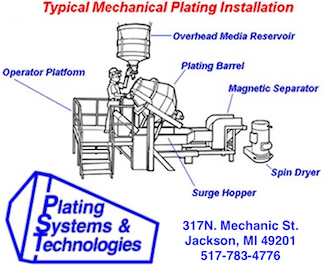
Home of the world famous 'finishing.com HOTLINE' since 1989
-----
Looking for an Int'l Std. spec for "High Corrosion Resistant Trivalent Blue Chromate"
2007
We are an international manufacturer of food production equipment which is a heavy user of stainless steel materials. With the high costs of stainless these days, we have found that many parts we produce can actually be made from carbon steel and then coated with High Corrosion Resistant Trivalent Blue (clear) Chromate. We get superb corrosion resistance at greatly reduced production costs.
Our problem involves getting this coating process specified to match an international specification which can be referenced to allow our other plant locations to duplicate the coating requirements outside the U.S.
My question is: What is an internationally recognized specification for calling out this finish? Is there an ISO or ASTM standard (or other) available to help us nail down this requirement on our specifications? (My current supplier of the finishing process nor the manufacturer of the raw materials are not sharing this information)
This information needs to be published if available.
Materials Manager - Galesburg, Illinois
Hopefully you'll get a more hopeful answer from another reader, Cory, but I think you have a problem in that RoHS-compatible trivalent chromates are still new enough that they are not generic yet. Some are better than others, or at the very least they differ vastly from others. Unless you specify one particular proprietary chromate you have no assurance of getting the same thing. So I would suggest that if you are getting "superb corrosion resistance", and you know the manufacturer of the chromating chemistry as your post implies that you do, that you specify that the job shops must use that chemistry. Any other approach is just not going to work.
Remember that zinc is not a "foodsafe" surface, so exercise care in which parts you apply this to. Also note that there is still a lot of hexavalent chrome conversion chemistry out there, and that is a far cry from food safe. If there is lead in the paint on children's toys from certain countries, as well as poison in the dog food, antifreeze in the toothpaste, cadmium in the jewelry, and drugs in the seafood, I think it would be naive to assume that the chromates will be hex-free just because you spec'd it. Good luck.

Ted Mooney, P.E.
Striving to live Aloha
finishing.com - Pine Beach, New Jersey
Ted is available for instant help
or longer-term assistance.
2007
I think Ted is right when he says that you have a problem. The problem is probably worse than Ted or you thinks it is. I have done some research on trivalent passivates with Zachary Kennedy, and we have developed from this research a theory as to how they protect zinc surfaces. Our results will be published in Plating and Surface Finishing later this month. You might be interested in reading this article before you expand your production of trivalent-passivated products used in the food industry.

Tom Rochester
CTO - Jackson, Michigan, USA
Plating Systems & Technologies, Inc.

2007
Going back to the standard you are asking. I heard that ASTM B633 it is going to be updated. I do not have a precise date, yet I think it would be in the next year.
Saludos
- San Luis Potosí, México
2007
Tom Rochester has understated a blockbuster article -- perhaps the most important surface finishing paper of the decade. Anyone who has not yet read his article in the Oct. 2007 issue of Plating & Surface Finishing should -- I am absolutely not kidding -- drop what you are doing and read it right now.

Ted Mooney, P.E.
Striving to live Aloha
finishing.com - Pine Beach, New Jersey
Ted is available for instant help
or longer-term assistance.
2007
No dead threads!
Your Q, A, or Comment puts this thread on The Finishing.com HOTLINE.